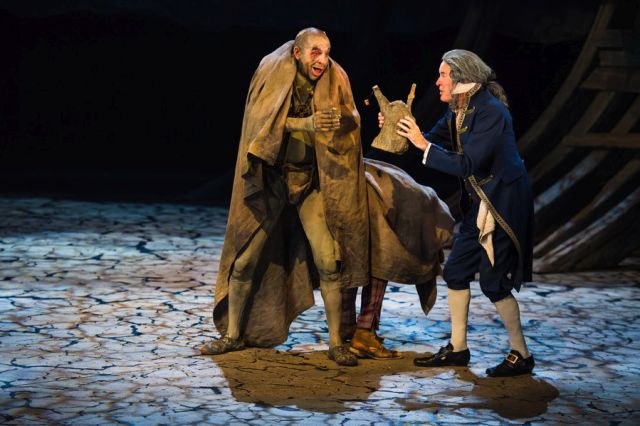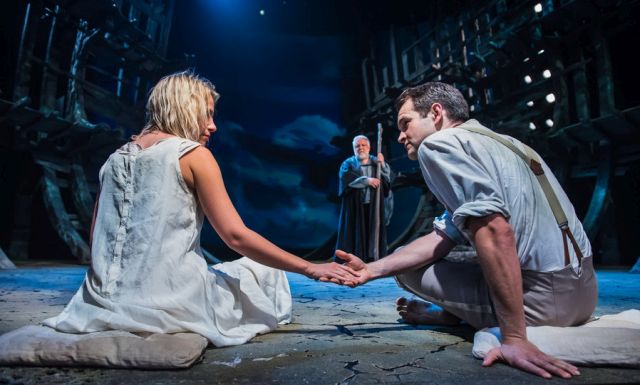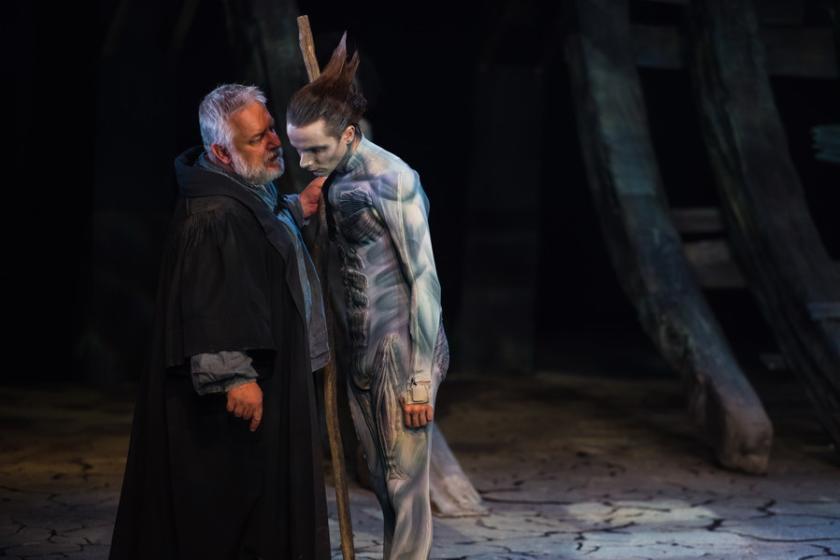Can The Tempest open on stage without a tempest – of crashing, shrieking and torment – and thus without what can become five minutes-plus of inaudibility? In Gregory Doran’s 2016 Stratford production for the RSC, revived at the Barbican Theatre, the answer is, as so often, no. Joe Shire, Darren Raymond and Caleb Frederick, playing mariners, have lines to deliver but against giant-wave effects and the supersonic demolition of a ship, they might as well stay mute. Not one bellowed word comes through, though Joseph Mydell as the kindly elder Gonzalo makes a good go of it.
As a show starts, so it will likely continue. This is a Tempest big on noise and arresting visuals, yet aurally it is all over the place. The action takes place on a deep stage, dominated on each side by the huge, curved, skeletal struts of a hull. This dangerously hollows out the Barbican’s wide proscenium. At the back is a vast screen, for the projection of multiple and multicoloured pictures – landscapes, monsters, weather.
After the storm, a rather wonderful whirligig unfurls and descends centre-stage, with – projected on to it – shimmering images of the (apparently) drowned. In an extravagant design by Stephen Brimson Lewis, collaborating with Intel and Imaginarium Studios, this is not going to be a chamber Tempest.
 Shakespeare wrote the play for interior court performance, not the original Globe. A “haunting sea-poem”, as one recent critical account rightly describes it, it is of course richly suggestive of spectacle. But one interesting test of its success as great art might be to sit with friends and read it out loud. Don’t perform it. Imagine it. The words alone build marvels, "The cloud-capp’d towers, the gorgeous palaces,/The solemn temples, the great globe itself", as Prospero says. In a drama as much about the learning of language and its usages as about usurpation and magic, it seems valid to demand that Shakespeare’s most evocative poetry do the work.
Shakespeare wrote the play for interior court performance, not the original Globe. A “haunting sea-poem”, as one recent critical account rightly describes it, it is of course richly suggestive of spectacle. But one interesting test of its success as great art might be to sit with friends and read it out loud. Don’t perform it. Imagine it. The words alone build marvels, "The cloud-capp’d towers, the gorgeous palaces,/The solemn temples, the great globe itself", as Prospero says. In a drama as much about the learning of language and its usages as about usurpation and magic, it seems valid to demand that Shakespeare’s most evocative poetry do the work.
Naturally, mere recital isn’t what a theatre company is about and the RSC impressively flexes its muscles here. Reinventing Ariel is surely one of the more fun things when directing The Tempest: Prospero’s spirit-factotum is played by Mark Quartley dressed in a skintight jumpsuit fixed up with sensors translating him into a “digital avatar” (as a programme note puts it) that flickers and dances in a live reflection of his movements around the set. And one of the more mesmerising moments is when this flitting sprite becomes a kind of gryphon, wings sinisterly flapping as Prospero’s usurpers are berated beneath its grotesque talons.
That said, this is also very much a play about being not of the spirit world but the mortal one. Prospero was displaced in Milan by a bunch of fellow-Italian nasties. His daughter Miranda (Jenny Rainsford, brilliantly flesh-and-blood, elegantly natural) falls instantly in love with the first young man she has seen, the tempest-borne Ferdinand – nicely self-ironised by Daniel Easton. Simon Trinder and James Hayes are vivid as the ship’s jester and sack-guzzler, Trinculo and Stephano, and the manner in which they agree to Prospero’s murder with Caliban – Joe Dixon (pictured above, with James Hayes) with horribly swollen belly and exposed backbone – is staged by Doran with greater gusto than the Italians’ flailing attempt to save themselves and return to power.
 Technology is the star of the show – more show, indeed, than play – and is put to amiable use in the famous masque scene celebrating Miranda and Ferdinand’s betrothal (Jenny Rainsford and Daniel Easton, pictured above). But I couldn’t work out why technology didn’t lie entirely behind this otherwise slightly static, over-sculpted passage in which actors could, I’m sorry to say, be dispensed with, especially given the tech at hand.
Technology is the star of the show – more show, indeed, than play – and is put to amiable use in the famous masque scene celebrating Miranda and Ferdinand’s betrothal (Jenny Rainsford and Daniel Easton, pictured above). But I couldn’t work out why technology didn’t lie entirely behind this otherwise slightly static, over-sculpted passage in which actors could, I’m sorry to say, be dispensed with, especially given the tech at hand.
The latter will be a delight for some, perhaps a problem for others. Simon Russell Beale as Prospero is not up to rivalling the evening’s digital wizardry. Highly praised in first reviews, some of which pointed out the advantages of Stratford’s thrust stage, he is somehow diminished in the cavern created in the Barbican. He walks his lines, in that dependable posh Shakespearian he’s made his own, and makes Prospero shouty and petulant where he could be authoritative and steely. Audibility is yet again an issue: he often talks with his back to the audience. More popstar and prestidigitator, please; less gabbling Oxbridge don. Afterwards my companion and I went as far as heretically agreeing that mikes and surtitles would have come in handy, too.















Add comment